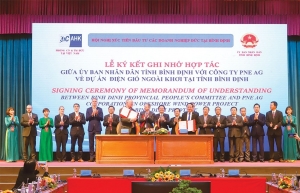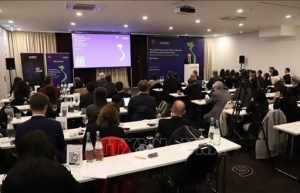Tracking Germany’s investment journey in Vietnam
| Marko Walde, Chief representative, AHK Vietnam |
The first German investments flowed into Vietnam shortly after the country opened its doors to foreigners. In 1992, Bültel (producing fashion for brands such as Camel Active) settled down in the southern province of Binh Duong. In the same year, outdoor brand Tatonka opened a backpack production line in Ho Chi Minh City. A decade later Van Laack – the first German investor in Northern Vietnam with fully-owned manufacturing in Asia – established its factory. German investments started to really gain steam when Vietnam ascended to the World Trade Organization in 2007, and received another impetus with the 2015 amendment of the enterprise and investment laws.
Since Germany and Vietnam elevated their bilateral relations to a strategic partnership in 2011, the cooperation between the two countries has developed strongly and extensively in various fields, including economic development. Today, about 500 companies from Germany have invested roughly $2.9 billion in Vietnam. They have created some 50,000 jobs, thereby continuing to make positive contributions to bilateral economic relations.
These German projects include large corporations but mainly small- and medium-sized enterprises, which have chosen Vietnam as an investment destination, thereby continuing to make a positive contribution to bilateral economic relations. Over three-quarters of projects and two-thirds of Germany’s investment capital in Vietnam focus on processing, manufacturing, IT, technical services, and banking and insurance.
Vietnam’s pandemic efforts indicated that the economy is a safe harbour for investors, despite many crises worldwide such as trade conflicts, supply chain bottleneck, war, and the slow reopening of China.
Vietnam’s GDP increased by 8.02 per cent in 2022. Although there is a low demand worldwide and high inflation rate, the Vietnamese government kept this under control and adjusted fiscal policies to ease inflationary pressure. German companies, therefore, are still confident on their business development.
According to the AHK World Business Outlook Survey Fall 2022, 86 per cent of German companies are confident with their business situation in Vietnam (as satisfactory and good) and 83 per cent will keep investing further in their local factories in Vietnam in 2023.
Meanwhile, the China+1 trend accelerated in implementation after the pandemic began. German businesses needed to rethink whether it was still adequate to rely on their suppliers or single country sourcing strategies, or if they needed to diversify their interests and minimise risk.
Since 2016, AHK Vietnam has received over 120 inquiries from German companies evaluating the setup of manufacturing activities in Vietnam. Most of the requests coming into our offices have some connection to China. They mainly emanate from production plants and/or regional headquarters located there. Over 20 enterprises invested here during this period, including Tesa, Kurz, Fischer, Magnetec, and Ziel Abegg.
| AHK Vietnam celebrates 10 years of dual vocational training with Bosch Vietnam this year |
Lessons and importance
The growth of foreign investment capital not only creates many favourable conditions for Vietnam to accelerate the time of international market expansion, but also improves in many aspects of business activities, reducing the burden of capital for many large projects.
In addition, the attraction and use of foreign capital also contributes to promoting economic transformation and restructuring, renovating the growth model, and improving the competitiveness of the country, products, and services. It promotes institutional reform, legal policies, a strong business environment, and helps develop a fully modern and integrated market economy.
Recognising the significance and role of overseas funding in Vietnam, the Vietnamese government has issued many policies and implemented solutions to create an attractive and safe investment environment. Enterprises themselves are also constantly improving in terms of human resources and production lines to attract investors.
Thanks to the EU–Vietnam Free Trade Agreement (EVFTA), Vietnam benefits a lot from German high technology, know-how, management skills, and dual vocational education and training, with more value-added production and less waste of material and resources. With agreed terms in the EVFTA, Vietnam has also shown strong commitments to protect people’s basic rights at work and the environment.
The EVFTA is a great approach and basement for implementing sustainable master plans, applying the German Supply Chain Due Diligence Act, and protecting human rights, the environment, and foreign investors.
In regards of dual vocational training, this year we celebrate 10 years of implementing this form of training together with Bosch Vietnam, which has educated and trained more than 200 apprentices in industrial mechanics and mechatronics.
Germany has been well known for its dual vocational training for decades and one of the hidden weapons for its economic growth. Therefore, AHK Vietnam exports and adapts to this model to support Vietnam in developing sustainable and skilled workers, in collaboration with German investors in the country.
During the official visit of chancellor Olaf Scholz last November, Germany inked energy cooperation pacts which showed commitment and support in crafting a model for sustainable development and environmental protection. In addition, German businesses with their long-term perspectives intend to work closely and intensively with local suppliers and to increase the level of local content to 30 per cent, which can make a major contribution to Vietnam’s economic growth.
Green opportunities
Vietnam has shown its strong commitment by setting a goal of net-zero emissions by 2050, reducing methane emissions by 30 per cent by 2030, gradually reducing and eliminating coal-fired power in 2030-2040, and protecting forests.
Green growth and the circular economy are becoming global trends as part of efforts to reduce greenhouse gas emissions and achieve carbon neutrality – and Germany has been a leader in the transition towards a low-carbon-energy system. As a result, German investors can lead the trend of green transformation, thus helping Vietnamese businesses and localities speed up green transformation towards realising sustainable development goals.
Taking advantage of support from the German investment community is critical for Vietnam in the context of limited domestic resources. Furthermore, this transition would help Vietnamese businesses improve their competitiveness and catch up with global market trends.
Climate change has forced enterprises to change their business models. One of the fundamental transformations implemented by SCG, for example, is ESG 4 Plus, being built with the major stages of Set Net Zero, Go Green, Reduce Inequality, and Embrace Collaboration, with high attention to harnessing good governance.
A new structure for Vietnam’s energy sources with an increased proportion of clean energy will be implemented. The Vietnamese government intends to create a more favourable environment and incentives for firms to use renewable sources, including natural hydro endowments and solar and wind power.
Most importantly, green energy will be one of the crucial factors affecting the investment decisions of German and international investors in the future. In December 2022, Vietnam signed a $15.5 billion Just Energy Transition Partnership deal with the purpose of helping wean the Southeast Asian nation off coal. Under this, Vietnam commits to a set of new targets that will avoid 500 megatons of emissions by 2035 and the agreement will help Vietnam build a 21st-century power sector.
The adoption of these types of political declaration reaffirms Vietnam’s strong, consistent commitment and great efforts in responding to climate change, demonstrating Vietnam’s responsibility to work with others in solving Earth’s greatest challenge.
 | Vietnam’s role in Germany’s commercial approach The transition process of the Development and Climate Alliance by Germany’s Ministry for Economic Cooperation and Development (BMZ) is in its infancy. The German government is anticipated to withdraw bilateral initiatives responsibly and on the basis of Germany’s cooperation expertise, as well as by combining knowledge acquisition from other countries that provide development aid. |
 | Fresh German milestones to come Since Germany and Vietnam elevated their bilateral relations to a strategic partnership in 2011, the cooperation between the two countries has developed strongly in various fields. According to the Vietnamese Ministry of Planning and Investment, as of December 20, 2022, Germany had over 440 valid projects in Vietnam registered at $2.37 billion, mainly focused on manufacturing, processing, and energy. Currently, about 500 German enterprises are active in Vietnam, creating 50,000 jobs. |
 | Germany ready to assist Vietnam in energy transition: official A German official has voiced the country’s readiness to become a trustworthy and capable partner helping with energy transition in Vietnam. |
What the stars mean:
★ Poor ★ ★ Promising ★★★ Good ★★★★ Very good ★★★★★ Exceptional
Related Contents
Latest News
More News
- Hermes joins Long Thanh cargo terminal development (February 04, 2026 | 15:59)
- SCG enhances production and distribution in Vietnam (February 04, 2026 | 08:00)
- UNIVACCO strengthens Asia expansion with Vietnam facility (February 03, 2026 | 08:00)
- Cai Mep Ha Port project wins approval with $1.95bn investment (February 02, 2026 | 16:17)
- Repositioning Vietnam in Asia’s manufacturing race (February 02, 2026 | 16:00)
- Manufacturing growth remains solid in early 2026 (February 02, 2026 | 15:28)
- Navigating venture capital trends across the continent (February 02, 2026 | 14:00)
- Motivations to achieve high growth (February 02, 2026 | 11:00)
- Capacity and regulations among British areas of expertise in IFCs (February 02, 2026 | 09:09)
- Transition underway in German investment across Vietnam (February 02, 2026 | 08:00)

 Tag:
Tag:

















 Mobile Version
Mobile Version